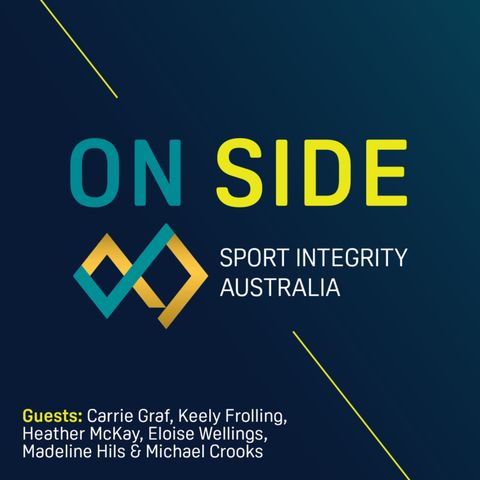Guests: Eloise Wellings, Madeline Hills, Michael Crooks, Carrie Graf, Keely Froling & Heather McKay How far has women’s sport come? Events like Australia's Twenty20 World Cup with a crowd of 90,000 in March suggest a long way. In episode four of our Sport Integrity Australia podcast ‘On Side’, we discuss parity in sport - where we’ve come from and what still needs to be done - with one of our greatest sportswomen Heather McKay, one of our greatest basketball coaches Carrie Graf and up-and-coming basketball star Keely Froling. We also chat to Baseball Australia’s General Manager Performance Pathways & Player Development, Michael Crooks, about the sport’s challenges – funding, match fixing, differences in anti-doping in the Major League - and creating pathways for young athletes dreaming big in the US. Finally, we talk to Gold Coast Commonwealth Games heroes Eloise Wellings and Madeline Hills who, along with Celia Sullohern, created one of the highlights of the Games when they waited for Lineo Chaka at the finish line, and triple Olympian Bronwen Knox answers the question “If one person in a team tests positive, does the whole team get tested?” A leading advocate for the equality in sport, Graf says there needs to be a shift in the thinking of what is a Return On Investment “rather than just commercial and eye balls”. “I was a little girl who grew up when there wasn’t any role models and you couldn’t aspire to work as a professional athlete, as a coach,” she says. “l was fortunate to have a professional coaching career for 20-plus years, I think we’re certainly seeing a shift that little girls can look on TV and look around the media and go ‘wow, I could do this a job’, and that that is a legitimate job but I still think there is a long, long way to go.” Froling, who has two brothers currently playing in the National Basketball League, says she often compares the rewards. “I look at what the boys get and what they’re doing and I think, ‘oh, it’s so annoying’ … we work just as hard if not harder than them and aren’t rewarded in the same way.” It’s certainly a long way from when McKay, a winner of 16 British Opens in a row, competed as an amateur, having to take two months off work without pay simply to play. As an amateur she says she played “for fun” and without the pressure athletes’ face now. “Today the pressure is there, the big money’s there, so when the money is there, certainly there is going to be a lot of pressure because you’ve got to perform and that’s really the difference between today and in my time. It’s their full-time job.” With significant contracts up for grabs for young baseballers overseas, Crooks is trying to develop right path for talented young players. “Managing the workloads and expectations for these young players is really, really critical to make sure that they get the most of their opportunity when they do finally get over to the United States as opposed to sending them over as a 16-year-old with no support mechanisms, no safety nets for them and basically leaving them to the wolves so to speak to try and survive in what is an incredible cut-throat world of professional sport,” Crooks says. In our From The Highlight Reel segment Australian 10,000m runners Eloise Wellings and Madeline Hills relive an act of sportsmanship that was beamed around the globe. “We were just doing what we would always do in any other race and it just so happened that there was a whole lot of cameras and a whole lot of people watching,” says Wellings, who concedes her own run was “one of the worst” of her career. “It takes vulnerability to finish a race like that for Lineo when things aren’t going well to run the last three laps on your own. As Madeline said you are very exposed and it’s a vulnerable thing to be in.” Madeline, agrees. “We’ve all had that day,” she says.See
omnystudio.com/listener for privacy information.


Comments